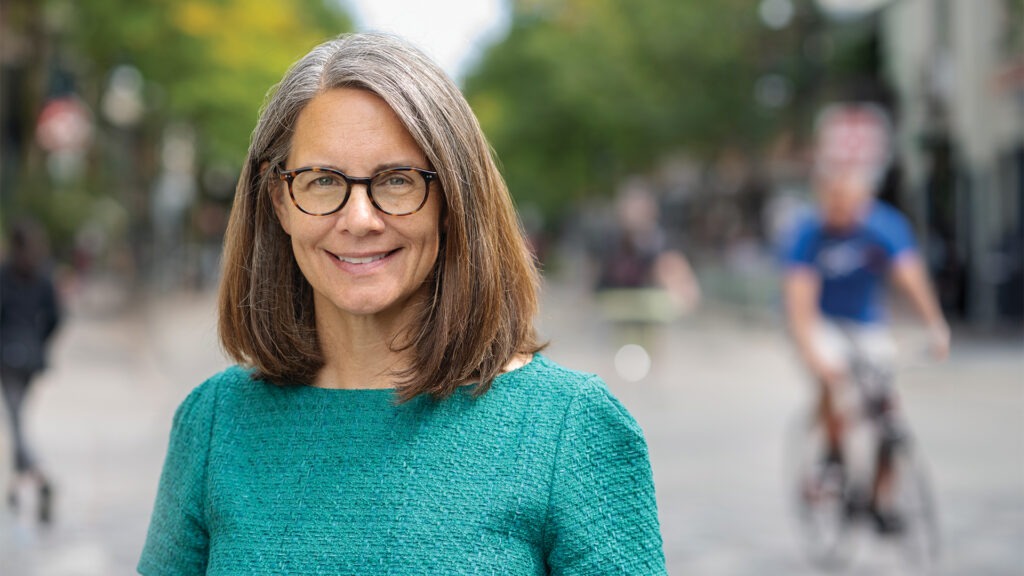
The UW–Madison Small Business Development Center, led by Michelle Somes-Booher, provides free, localized support to start and grow Wisconsin businesses.
There’s nearly a thousand small business development centers across the country, but ask anyone who has worked with the one at UW–Madison, and they’ll tell you that it’s something truly special.
Located within the Wisconsin School of Business, the UW–Madison Small Business Development Center (SBDC) provides no-cost consulting and dozens of noncredit courses to help businesses launch, expand, and thrive. With support from a small but mighty team of consultants and outreach specialists, small businesses can get advice on topics from financial planning to team building, and everything in between.
“It’s really the Wisconsin Idea in action,” says center director Michelle Somes-Booher. “No matter your connection to the university, we can help you. We can educate you. We can review your business plan. We can do all kinds of things for you that won’t cost you anything.”
“It’s really the Wisconsin Idea in action.”
—Michelle Somes-Booher
The SBDC consults with around 500 clients a year—plus an additional 200 or so who call with one-off questions—and no two look the same.
“Every business that starts is a small business,” says Somes-Booher. “We’ve had clients in construction, software development, manufacturing, educational services, and many more industries. We like to say that we’re here to provide high-level help to get you going—then point you in the right direction for more industry-specific assistance.”
Rooted in Wisconsin
If a nationwide network of small business support sounds like a good idea, it’s because it came from Wisconsin.
In 1980, Senator Gaylord Nelson crafted legislation which paved the way for small business development centers to be created at universities and other locations across the country and funded through federal dollars. The idea of providing free, localized support to start and grow a business—and increase its chances for success—is a model that’s remained politically popular for over 40 years, and for good reason.
“We return a lot of impact to the economy,” says Somes-Booher. “For every dollar that Congress spends on the program, it produces about $60 to $70 back in economic impact.”
While the mission of the SBDC has stayed the same, its work and scope have evolved over the years. When Somes-Booher took over as the center’s director in 2016, she began implementing new resources to keep pace amid a rapidly changing business landscape.
That includes the creation of SBDC’s First Steps to Starting a Business course, which guides participants through everything from the feasibility of their idea to assessing personal strengths as a business owner.
“We’ve had someone from every county in Wisconsin, every state, and 40 different countries take that class,” says Somes-Booher. “For a free online course, you’d be happy if 5% of people finished it, but we have a nearly 50% completion rate.”
The team also provided another invaluable service in 2020 when the COVID-19 pandemic upended operations for businesses and created unprecedented demand for SBDC’s guidance.
“We saw record numbers of people during that time,” says Somes-Booher. “In addition to our current clients, we had past clients coming back to us for help understanding all these new government programs.”
While working to translate lengthy government missives into easy-to-consume newsletters, the SBDC team revamped their entrepreneurial training program, moving most of their non-credit courses online. They also created a free workbook, Navigating the New Normal, which racked up hundreds of downloads upon release.
“We did many different things to pivot, which has actually shaped the offerings we provide now,” says Somes-Booher. “I’m incredibly proud of the work our crew did during that time.”
Consultation with innovation
Somes-Booher and her team have also been proactive in getting WSB students involved in their work. There’s no federal requirement to utilize students, but they realized the value of doing so—both for the students themselves and their clients.
The SBDC now works closely with WSB’s student-led Badger Consulting Club. Each semester, the SBDC secures four consulting projects for the club, which include real consultations with real clients, as well as invaluable feedback for the students.
Most recently, the SBDC launched its Small Business Accounting and Projection Clinic, which helps founders navigate arguably the most daunting part of starting a business: the finances. In addition to offering a free, online Beginner’s Guide to Financial Projections course, the clinic hires undergraduate and graduate students from WSB’s highly ranked accounting program to assist clients with creating the financial projections necessary for securing loans.
While the SBDC’s body of work is vast and often complex, their efforts have not gone unrecognized. In addition to receiving a 100% client satisfaction rating for two years in a row, the Small Business Administration (SBA) recently recognized the team with the Great Lakes Regional Small Business Development Center Excellence and Innovation Award.
The team’s nomination for the honor was supported by entities including WSB, the Wisconsin Alumni Research Foundation, the city of Madison, and the Wisconsin Women’s Business Initiative Corporation, which partners with SBDC to provide Spanish-speaking consultation services.
The secret sauce to all of this success, says Somes-Booher, is the people. Because while there may be hundreds of small business development centers nationwide, there’s only one with her team.
“They’re just a really great team to work with,” says Somes-Booher. “They’re incredibly talented and really care about their clients.”
Read more Homegrown Success Stories
Written by Chris Malina
Photography by Paul L. Newby II
Link to original story: https://business.wisc.edu/update-magazine/small-business-development-center/
